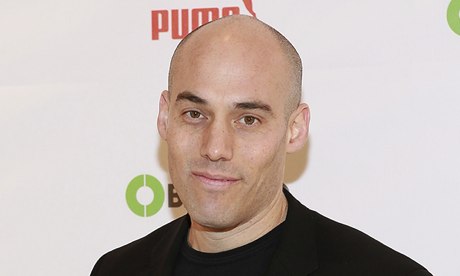Joshua Oppenheimer on The Act of Killing and its impact in the United States

Hi Joshua, how does it feel to win our film of the year?
- The Act of Killing
- Production year: 2012
- Countries: Rest of the world, UK
- Cert (UK): 15
- Runtime: 115/159 mins
- Directors: Christine Cynn, Joshua Oppenheimer
- Cast: Hajif Anif, Syamsul Arifun
I was amazed to hear we'd won. To be at the top of not just a documentary list, but a film list is really special.
How will you celebrate?
You're announcing it on the day of our Christmas party at our production company. In Denmark the annual Christmas party is probably the most important cultural institution in the country. Everybody gets extremely drunk. Except for me: I always leave early and people think I'm not in the spirit.
Can we get you a drink at least?
I'm not a big drinker. Maybe I will try to partake in Akvavit [a 40% spirit flavoured with carroway or dill] and pickled herring. It doesn't sound good, right? At our production company the trademark dish – and this sounds particularly revolting – is curried pickled herring. So if people want to know the secret behind the editing of The Act of Killing – it was a daily helping of curried pickled herring on Danish rye bread.
Have you been surprised by the reaction to The Act of Killing?
In the UK it was really spectacular, but yes – overall I have. I really believe in the film and I was hoping that the reaction would be positive, butthe reaction has been overwhelming. I didn't expect that. In America – although the reaction there was great as well – the mainstream media is a little bit more conservative. I think it would be unimaginable for a documentary to at the top of a film list there.
What kind of reaction did you get in the States?
I think Americans are aware that they are involved in all sorts of violence around the world. They normally don't want to look at that. But because this is a film about the consequences of not looking at things, Americans were coming out of this film asking: "How were we involved?"
Was that part of your reason for making it? That you want people to question what their country does?
Absolutely. The film's been welcomed in Indonesia as an Indonesian film about Indonesia, not as a foreign film. But at the same time the film is also an American film – by an American – about America. And that was very much on my mind.
Some of the first death squad leaders I filmed were these old men who took me to this clearing on the Snake river, where they had helped kill 10,500 people. Busloads of prisoners from army concentration camps going there every night and them cutting off their heads. And they took me there and showed me gleefully how they went about it. They started posing for photos – snapshots – with the river behind them, giving the thumbs up and the V for victory and smiling That was in February 2004.
In April 2004, the Abu Ghraib photos appeared. I made this film in pace with this evolving nightmare in the US in which torture was being not just condoned, but celebrated. Celebrated defensively – just as the perpetrators celebrate genocide defensively in the Act of Killing because they know it's wrong but are insisting on its correctness.
I was so shocked and outraged – I don't know why, because I was well aware of America's role in torture across Latin America, and I knew of the Phoenix programme in Vietnam, where they were targeting and killing civilians. That was modelled after the killings in Indonesia. So I don't know why I was so shocked.
Do you worry – especially with the awards season coming up – that you're never going to be able to extricate yourself from this story? That you're always going to be Indonesian Death Squad Guy?
[laughs] I remember when the Guardian interviewed me in Sheffield you asked me what my nightmares were. You were the first paper to do that – to ask me what I dream. And so this kind of personal question, it's part of our dialogue.I guess overall it's a privilege to be this conduit. I'm now making a second film which I think complements the Act of Killing perfectly in terms of answering so many of the questions people come to the film with.
Tell us about the second film
The working title is The Look of Silence. It's kind of a poem about the silence born of terror that the survivors live under and the trauma that comes of breaking that silence. The film follows a family of survivors with whom I was working from the very beginning of my time in Indonesia. During the two years I was filming all the perpetrators I could find – before I met Anwar – I filmed men who killed the son in this family. Some of the people in the family wanted to see this footage. The youngest brother in this family was born after the killings, with the burden of being seen by his mother as a replacement for the dead older brother. And he decides that he is no longer content to live in silence. He decides to go and confront all of the men involved with his brother's death.
It's unimaginable for survivors to go and visit the perpetrators and confront them. There have been films where survivors meet perpetrators, but it's always in the context of some historical change, where the perpetrators have been removed from power, at least partially. Here the main character's visits are met with threats, with fear, with anger.
One of the things that has been interesting editing the film is seeing that whenever you make a film about survivors of atrocities you're walking in this minefield of cliches. Film-makers normally represent the survivors as saintly and good so that the viewer has a comfortable place with which to identify. I think that the cliches of human rights documentary largely serve to reassure the viewer and are dishonest and do nothing or a disservice to the survivors and the experience of being a survivor.
Obviously your relationship with the survivors doesn't end when these films end. Can you ever leave these documentaries behind?
I don't want to leave the films behind. I don't really want to leave anything in life behind. We have bad experiences, we have difficult experiences, but if you leave everything behind you have no past.
Still, finishing the Look of Silence will be me saying goodbye to Indonesia. I can't go back since releasing The Act of Killing. I shot the bulk of the second film knowing that. I get threats regularly on Facebook and email. I think I could get into Indonesia now, but I have reason to think I wouldn't get out again safely.
hink I wouldn't get out again safely.

Sign up for the Film Today email
The top headlines each weekday delivered straight to your inbox in time for your evening commute.
Sign up for the Film Today emailI am using the Free version of SPAMfighter.
SPAMfighter has removed 1625 of my spam emails to date.
Do you have a slow PC? Try a free scan!
| Reply via web post | Reply to sender | Reply to group | Start a New Topic | Messages in this topic (1) |
to Subscribe via email :
batavia-news-subscribe@yahoogroups.com
----------------------------------------
VISIT Batavia News Blog
http://batavia-news-networks.blogspot.com/
----------------------------
You could be Earning Instant Cash Deposits
in the Next 30 Minutes
No harm to try - Please Click
http://tinyurl.com/bimagroup
--------------



No comments:
Post a Comment